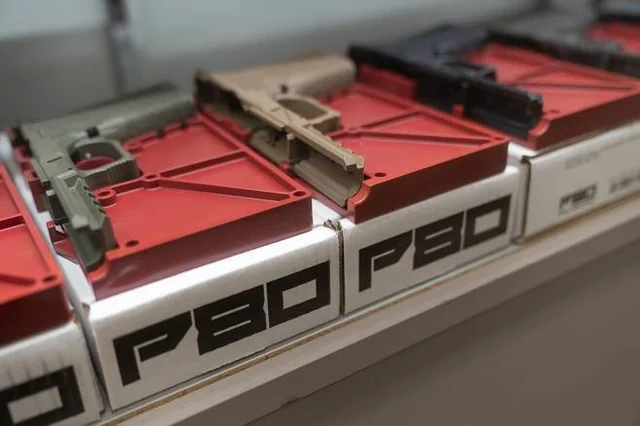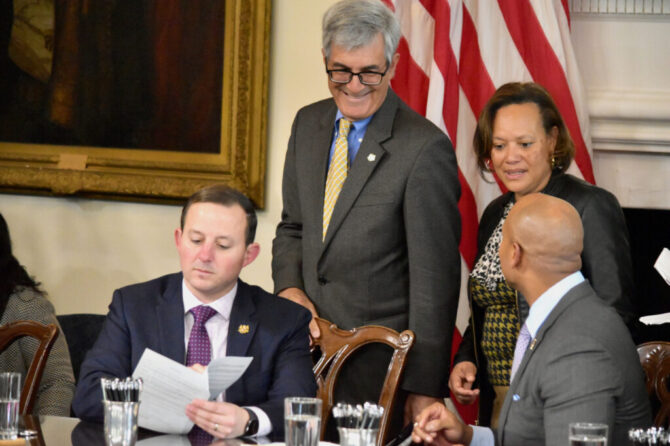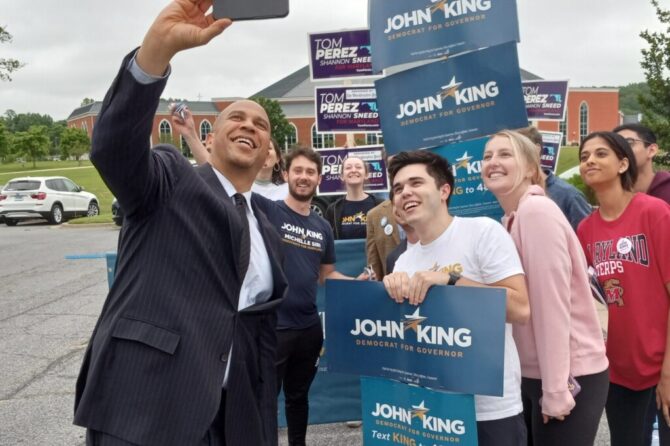BALTIMORE BANNER: Baltimore Mayor Brandon Scott said Wednesday his office has reached a settlement with Polymer80, one of the largest makers of ghost gun kits and parts in the nation, that will prevent the company from advertising and selling its firearms in Maryland. The company will also pay $1.2 million in damages.
“Ghost guns,” or firearms without a serial number, are increasingly common in Baltimore, with police recovering hundreds a year in connection to street crime with no way of tracing their origin. In 2022, Scott’s office filed a lawsuit against Polymer80 and a Hanover gun store, claiming they had flooded city streets with the illicit weapons, creating a public nuisance. The suit against the gun store, Hanover Armory, remains pending.
“We must hold everyone who has a hand in this violence accountable, from those who choose to pull the trigger, all the way up to the gun dealers and manufacturers responsible for the flow of guns into our city,” Scott said in a news release. “This settlement — and the statement it sends about the harmful impact of these ghost guns — is a critical victory for the effort to confront gun violence in our communities.”
Maryland lawmakers banned the sale of un-serialized firearms in 2022, and Scott announced the city’s lawsuit against Nevada-based Polymer80 the same day the ban took effect. President Joe Biden’s administration, also in 2022, directed the Bureau of Alcohol, Tobacco, Firearms and Explosives to broaden its definition of a firearm in an effort to limit the sale of un-serialized weapons nationally.
In the calendar year before Maryland banned the sale of ghost guns, Baltimore Police recovered 402 Polymer80 brand guns, a Baltimore Banner review of firearm recovery data shows. The year following the ban saw a slight decrease, with 373 Polymer80 brand guns recovered by police.
The settlement, agreed to Tuesday afternoon, according to Scott administration officials, is the latest in a series of legal losses for Nevada-based Polymer80, which has seen its ability to do business curtailed in recent years. City officials in Washington D.C. and Los Angelesalso sued the company, and in both cases Polymer80 agreed to a cash settlement and restrictions on its business in those places.
Baltimore’s settlement goes the furthest yet to limit the ghost gun company. In addition to ending sales and advertising in the state, the agreement also prohibits Polymer80 dealers in nearby states from selling parts and kits to Maryland residents, an attempt to close one of many long-standing loopholes in Maryland’s gun laws. Many neighboring jurisdictions, like Pennsylvania or Virginia, have more lax firearm laws and Maryland residents have been able to travel there in order to purchase prohibited items, like high-capacity magazines. The company will provide the city with quarterly reports of all ghost gun sales in neighboring states, according to the mayor’s office.
Polymer80 must also cease all customer support in Maryland and prominently state on its website that it will not distribute or sell ghost guns there, per the terms of the settlement.
While the settlement will likely slow the flow of Polymer80 guns to Baltimore, it is unlikely to eliminate ghost guns from city streets. A person using a 3D printer that costs less than $500 can make the parts from plans readily available online. Police arrested a man in late 2022 after serving a search warrant at his house and finding several unfinished guns he had 3D printed there, according to court records.
Baltimore Police now track whether a firearm they recovered was 3D printed as part of its lab reports on guns taken into evidence.
Polymer80 became popular among the city’s underbelly in part because of the ease at which they could be obtained — the company sold a kit called Buy, Build, Shoot which could be ordered online and included all the needed parts, minus tools, to quickly assemble a functioning firearm. Because the guns were sold unfinished, they were not covered under the ATF’s old definition of a firearm and could be sold without background checks or other documentation.
And while the company never directly marketed to would-be criminals, the product’s appeal was inherent to them, Johns Hopkins University Professor and gun violence researcher Daniel Webster said.
“Once you get the products out there, it’s very very difficult to connect them to individuals and hold them accountable. And that’s the business model,” he said.
The Polymer80 lawsuit is one of several ways Scott has looked to handle gun violence beyond traditional policing. In December, he directed the city to file suit against the ATF in an effort to get firearms trace information for guns with serial numbers that are recovered at crime scenes. That data would reveal which gun stores are selling the most guns that are later linked to crimes, but it is not supposed to be shared outside of law enforcement agencies.
“We are doing everything in our power to ensure that we address gun violence that far too many Baltimoreans have experienced,” City Solicitor Ebony Thompson said in a news release.
The Mayor’s Office of Neighborhood Safety and Engagement has spent millions of mostly federal, one-time pandemic relief dollars on community-oriented approaches to solving the issue.
Gun violence as a whole decreased significantly in 2023 compared to years past, with Baltimore recording the largest year-over-year reduction in homicides in at least five decades. Shootings and homicides in 2024 are down slightly compared to the same period in 2023.










